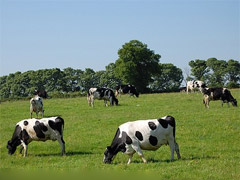
100 protesting ‘cows’ run amok on central London streets as Ipsos MORI survey reveals 60% of people would never buy milk from ‘battery’ cows
Gigantic sheds, housing thousands of ‘battery’ cows which have little or no access to grazing and are milked a gruelling three times a day, producing milk that could have fewer nutrients.
That American reality is the future for dairy farming and milk production in the UK if a massive indoor farm at Nocton in Lincolnshire housing 8,100 high yield Holstein dairy cows gets the go-ahead, says WSPA (World Society for the Protection of Animals), one of the world’s leading international animal welfare charities.
Today WSPA UK has released shocking footage revealing the conditions that cows can be subjected to in the worst incidences inside US industrial mega dairies. This footage is a warning to the UK that allowing industrial dairy farming to become the norm could pave the way for extremes of poor welfare and environmental pollution as found in the USA today.
Filmed at several locations in California over seven days in July by an undercover WSPA team posing as documentary makers, the footage reveals vast factory-like milk production systems where cows are housed in seemingly endless sheds surrounded by manure-filled lagoons, fly infestations and row upon row of female heifer calf crates.
Mike Baker, Chief Executive of WSPA, said: “During our investigation we found school children having to drink bottled water to avoid the nitrate poisoning in their own well, residents unable to barbecue or play outside because of the swarms of biting flies, and streams clogged with nitrate-thriving algae. California’s dairies are a far cry from the folksy image they are marketed to be and this story should stand as a warning to British consumers, farmers and rural communities of what could happen should ‘mega-dairies’ get the go ahead and become commonplace in the UK.”
Nocton Dairies, the company behind the proposed development – the first of its kind in the UK – is believed to be re-submitting their planning application this autumn, after they withdrew an earlier version in April when North Kesteven District Council and the Environment Agency requested more details on slurry disposal systems.
To reinforce their message, today WSPA UK has also launched a campaign - “Not In My Cuppa” – asking the people of the UK whether they would want their milk to come from battery cows.
Ipsos MORI research released today by WSPA UK reveals that 60% of British adults say they would never knowingly buy milk produced by battery-farmed cows. *
WSPA UK also staged the escape of 100 “cows” in central London. 100 WSPA UK supporters will be dressed up in prison-style jump suits and pantomime cow heads lobbying the government and the general public.
Mike Baker added, “Nocton Dairies is a glimpse of the future: thousands of indoor battery cows, overworked to exhaustion and their welfare compromised; housed in a cubicle system associated with an unacceptably high risk of fear, pain and behavioural problems. Is this how consumers want their milk produced?”
“We know from talking to British dairy farmers that this doesn’t have to be the way forward. Many share our concern that the Nocton development could be a tipping point in the UK dairy industry and the major nail in the coffin for a farming system appreciated and valued by millions of British consumers. This is the wrong direction for British farming and allowing this proposed facility will open the floodgates and vast, intensive dairy farms will inevitably become commonplace. The USA has this system in place and indoor dairy farms housing up to 15,000 battery cows are not unusual. Our filming in the USA revealed many farmers would like to turn back the clock but for them it’s too late.”
Neil Darwent, a Somerset dairy farmer and Nuffield Farming Scholar, said: “We must strive to allow cows to produce good milk yields from grass-based feeding, to give birth to valuable male calves and enjoy a long and healthy herd life in conditions which allow them to behave naturally.”
“We buy our food from fewer and fewer outlets. Supermarket domination is driven by the streamlining of the food chain, with centralised distribution and processing permitting economies of scale. In turn, fewer and fewer large suppliers are sought to feed into this chain. It is a step too far to demand that the livestock who produce our food such as the cows at Nocton Dairies are made to fit in with this increasingly industrial procurement.”
If the reputed £50 million development at Nocton were to get the go-ahead in late 2010 or early 2011, milking would be likely to start before the end of 2011. Milk output from the farm when it is at maximum capacity will reach an estimated 250,000 litres a day.
* Ipsos MORI interviewed 2019 UK adults for WSPA UK between 4th – 10th June 2010.


